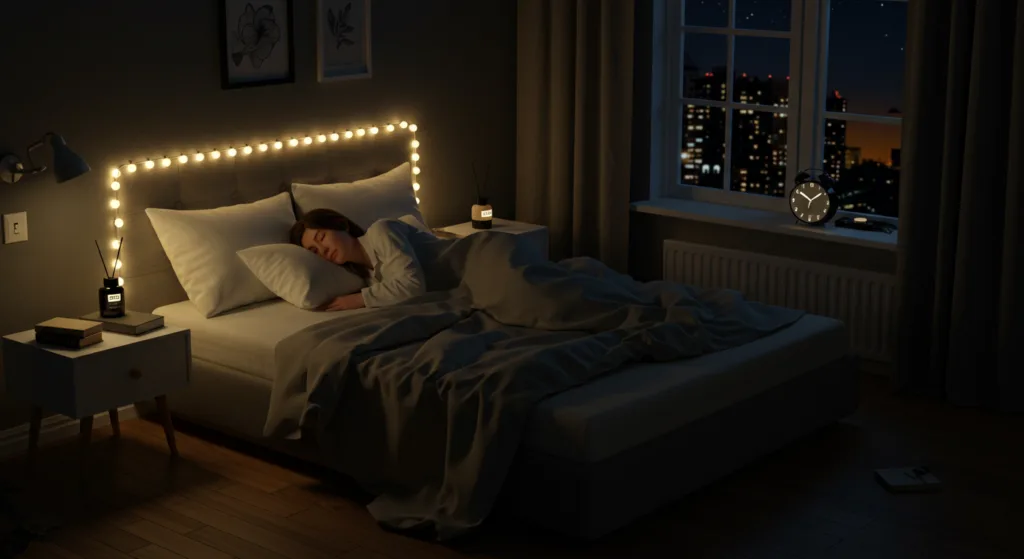Improve sleep: Practical Tips for a Restful Night’s Sleep

Have you ever found yourself staring at the ceiling, tossing and turning, wondering why you can’t improve sleep? You’re not alone. Many of us struggle with sleep—whether it’s trouble falling asleep, staying asleep, or waking up feeling more tired than when we went to bed.
Understanding how to improve sleep can make a huge difference in your overall well-being. But don’t worry! We’re here to share practical tips on sleep optimization, so you can wake up feeling rested and energized every single day.
This article covers easy ways to enhance your sleep hygiene, the role of melatonin, and natural remedies for insomnia. Let’s get started!
How to Build a Solid Sleep Hygiene Routine
The foundation of great sleep starts with a solid sleep hygiene routine. Sleep hygiene is just a fancy way of saying “healthy habits around bedtime” that help you sleep better. Think of it as the little things you do every day that tell your body it’s time to wind down and rest.
Here’s a simple list to help you get going:
- Keep a routine: Aim to sleep and wake up at consistent times daily, including on weekends. Your body loves routine.
- Create a relaxing bedtime ritual: Reading a book, doing some light stretching, or listening to calming music helps signal your body that it’s time to relax.
- Limit naps during the day: If you need to nap, keep it short—around 30 minutes—and make sure it’s earlier in the day.
- Make your bedroom a sleep-friendly environment: Keep your room cool, quiet, and dark. Investing in the right mattress and a comfy pillow can make a huge difference.
Melatonin Benefits to Improve Sleep
Melatonin is a naturally occurring hormone that helps regulate your sleep cycle. It helps our body identify the right time to sleep and wake up. But how does it improve sleep quality?
People often use melatonin supplements to help with falling asleep or adjusting to different time zones. While it’s always best to try natural methods first (like improving your sleep hygiene), melatonin can be a helpful tool if you’re in a bind.
Here are some things to know about melatonin:
- It helps you fall asleep faster: If you’re a night owl who struggles to fall asleep, melatonin might help you reset your internal clock.
- It’s safe in the right doses: A small dose (0.5–3 mg) taken 30–60 minutes before bedtime can be effective for most people.
- It’s not a one-size-fits-all solution: Some people find melatonin helpful, while others don’t notice much of a difference.
Before taking melatonin regularly, it’s important to consult with your doctor, especially if you have any underlying health conditions.
How Blue Light Affects Your Sleep
In today’s world, we spend a lot of time staring at screens—whether it’s our phones, laptops, or TVs. But did you know that blue light from these devices can seriously mess with your sleep?
Blue light interferes with the production of melatonin, tricking your brain into thinking it’s still daytime and making it harder to unwind and drift off.
So, how can we beat the blue light blues? Here are a few simple tips:
- Cut back on screen use before sleeping: Aim to stay off devices for at least an hour before bedtime. Use this time to read a book or do another relaxing activity.
- Use blue light filters: Many devices now have built-in blue light filters, or you can download apps to help reduce blue light exposure.
- Consider blue light-blocking glasses: If you must be on your phone or computer at night, investing in a pair of blue light-blocking glasses can help minimize the impact.
Natural Ways to Beat Insomnia
Insomnia can feel frustrating, but there are natural ways to fight it without relying on medication.
Here are some easy, effective techniques that might help you beat insomnia:
- Relax your body and mind: Deep breathing exercises or progressive muscle relaxation can help reduce stress, release tension, and calm your mind before bed.
- Try herbal infusions: Chamomile, valerian root, and lavender are known for their soothing benefits. Drinking herbal tea before bed can help you relax.
- Limit caffeine and alcohol: Both can interfere with deep sleep, so try to avoid them in the hours leading up to bedtime.
- Exercise during the day: Regular physical activity improves sleep quality. Make sure to complete your workout a few hours before bed.
If you’re still struggling with insomnia despite trying these natural methods, consider speaking with a healthcare professional to explore other options.
FAQs
Takeaway
Optimizing your sleep doesn’t have to be complicated. With simple adjustments like improving your sleep hygiene, avoiding blue light, and trying natural remedies for insomnia, you can sleep better and wake up refreshed.
If you found this article useful, share it with a friend and subscribe to our free newsletter at the bottom of the page so that I can send you more tips on how to get a good night’s sleep.


